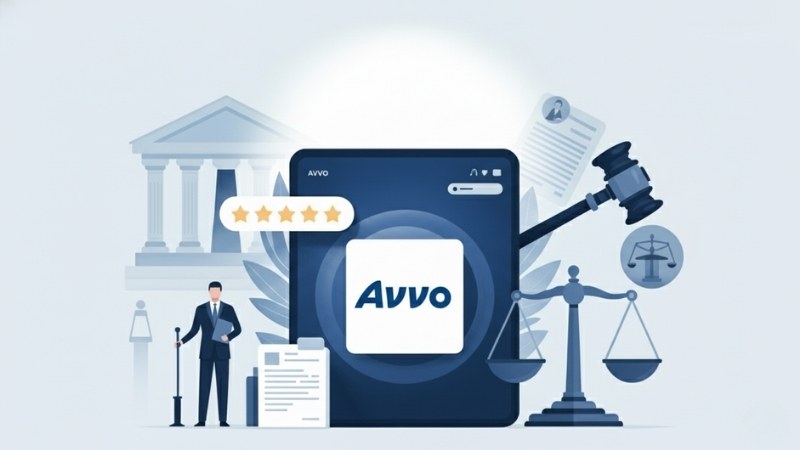What is Avvo Rating for Lawyers? A Complete Guide for Attorneys
There are more than 1.3 million lawyers in the United States, which means clients often feel overwhelmed when deciding which attorney is right for them. With so many options, potential clients rarely rely on word of mouth alone. Instead, they turn to platforms like Avvo, where attorney ratings frequently appear on the first page of Google.
For many users, an Avvo score acts as a quick snapshot of credibility. It blends peer endorsements, client reviews, and public information into a single rating that influences first impressions. As more clients search for legal services online and compare attorneys side by side, a high Avvo rating can tip the scales in your favor.
This guide will unpack how Avvo ratings work, why they matter, and what legal professionals can do to improve their standing. Stay with us, because the details might surprise you.
What is an Avvo Rating?

An Avvo rating is a numerical score ranging from 1 to 10 that gives consumers a quick snapshot of an attorney’s credibility. Consider it a digital report card that simplifies how potential clients view lawyers when comparing options.
Instead of digging through court records, client reviews, or state bar associations directly, people can glance at this score and make an initial judgment about whether an attorney seems like the right fit.
What makes Avvo unique is that profiles exist for nearly every licensed legal professional in the United States, whether the attorney has claimed their profile or not. This means many lawyers already have an online presence on Avvo, even if they never signed up for the platform themselves.
Clients searching for legal services online often come across these profiles, which can influence their perception before the first phone call or consultation.
It’s important to understand that an Avvo rating does not measure raw legal skill. Instead, it reflects a combination of factors such as professional achievements, years in practice, disciplinary actions, and information Avvo collects from regulatory agencies and public sources. For example, a lawyer who has completed speaking engagements, earned peer endorsements, and maintained a clean record with their state bar is more likely to have a high Avvo rating.
In short, the Avvo score works as a tool for consumers to make informed decisions quickly, but it’s only one piece of the puzzle. Much like a report card, it captures certain elements of performance, but it does not tell the full story of an attorney’s ability in the courtroom.
Avvo Score Range and Designations
Avvo assigns attorneys a numerical score that ranges from 1.0 to 10.0. Each score corresponds with a designation that helps potential clients interpret an attorney’s credibility at a glance.
| Score Range | Designation | Meaning |
|---|---|---|
| 9.0 – 10.0 | Superb | Strongest reputation, highly trusted by Avvo users |
| 8.0 – 8.9 | Excellent | Very reputable and well-regarded, above average |
| 7.0 – 7.9 | Very Good | Safe, competent, and reliable option |
| 6.0 – 6.9 | Good | Decent reputation but may lack recognition or visibility |
| 5.0 – 5.9 | Average | Neutral standing that neither strongly helps nor hurts credibility |
| 1.0 – 4.9 | Concern to Extreme Caution | May indicate disciplinary actions, missing data, or incomplete profile |
It’s worth noting that Avvo does not assign a numerical score if the attorney has not claimed their profile. For many lawyers, this means failing to verify or complete their attorney profile can unintentionally create doubt about their credibility with potential clients.
Clients tend to interpret a score of 7.0 or higher as a sign of competence, even though the Avvo score does not directly measure case outcomes or trial success. A high Avvo rating often signals professionalism and trustworthiness, making it a powerful influence when consumers compare law firms and other attorneys online.
How Are Avvo Ratings Calculated?

Ever notice how some attorneys showcase a Superb 10.0 rating while others sit much lower? The difference lies in Avvo’s proprietary algorithm. According to Avvo’s support page, the score is generated using a mathematical model, and every lawyer is evaluated on the same set of standards.
While the exact formula remains undisclosed, there are several well-known factors that help determine an attorney’s rating.
Key factors that influence Avvo ratings include:
- Years licensed and practice activity – Longer time in practice often signals reliability and credibility.
- Education and credentials – Advanced degrees, certifications, and specialized training add weight to an attorney’s profile.
- Professional achievements – Awards, publications, and speaking engagements demonstrate recognition within the legal community.
- Disciplinary history – Penalties or actions recorded by state bar associations or other regulatory agencies can lower the score.
- Peer endorsements – Positive recognition from other attorneys helps strengthen professional credibility.
- Client reviews and referrals – Feedback from clients often reinforces trustworthiness and attracts potential clients.
- Profile completeness – Attorneys who claim their profile, verify details, and update professional information tend to have higher scores.
Avvo reviews work by combining these elements into a single numerical score that many clients treat as a quick measure of trust. Still, it is important to note that the rating does not evaluate case outcomes, courtroom skills, or personality. What Avvo does provide is a consistent way for consumers to compare law firms and make informed decisions online.
Limitations and Criticisms of Avvo Ratings
For all the attention Avvo ratings receive, they are far from perfect. Many lawyers appreciate the visibility that comes with an Avvo profile, yet the legal community has often pointed out flaws in how these ratings are understood by potential clients.
Key criticisms from the legal community include:
- Does not measure legal skill or outcomes – A lawyer may achieve outstanding case results but still have an average Avvo score if those victories are not documented in the attorney profile.
- Profile gaming is possible – Lawyers who spend time filling out every section, adding professional achievements, and requesting peer endorsements can appear stronger than others who focus on actual practice.
- Paid features can confuse clients – Tools like Avvo Pro and sponsored placements improve visibility but do not affect the numerical rating. Still, many clients mistakenly assume payment boosts the attorney rating.
- Considered opinions, not facts – Courts have recognized that Avvo ratings are expressions of opinion protected by free speech, not verified factual assessments of legal ability.
While these concerns are valid, Avvo still plays a role in modern digital marketing for law firms. A complete profile with positive client reviews and peer endorsements can attract potential clients searching for legal services online.
At the same time, lawyers should approach Avvo ratings with balance, using them as one piece of a broader reputation strategy rather than relying solely on the score to build credibility.
Why Avvo Ratings Are Important for Attorneys?

Imagine someone browsing online for legal help. Before reaching a law firm’s website, they may come across an Avvo profile displayed on Google’s first page. In that moment, the attorney’s Avvo rating often shapes the first impression.
Online research heavily influences decisions. According to a survey, 74% of people check more than one review site before choosing a professional. For attorneys, that means Avvo can carry as much weight as Google reviews or word-of-mouth referrals.
Reasons Avvo ratings hold significance:
- A score of 7.0 or higher builds confidence for most clients and helps attorneys appear more trustworthy.
- Higher ratings often translate into more calls, consultations, and inquiries.
- Many consumers use Avvo to compare lawyers side by side, which makes a high score a competitive edge.
- Profiles with peer endorsements, client reviews, and detailed professional achievements stand out against incomplete listings.
Still, an Avvo score is only one factor in building a strong reputation. Successful law firms rely on consistent client results, trusted referrals, and professional credibility beyond what any rating system captures.
Avvo can boost visibility, but it should work as part of a broader reputation strategy that includes reviews, referrals, and a well-maintained attorney profile.
How to Improve Your Avvo Profile Rating as a Lawyer?

Many lawyers are surprised to discover they already have an Avvo profile, even if they never created one themselves. The difference between an average score and a high Avvo rating often comes down to whether the profile has been claimed and actively managed.
Taking a few intentional steps can significantly improve how potential clients view your credibility online.
1. Claim your Avvo profile
Start by visiting Avvo.com and navigating to the Lawyer Marketing page. Enter your full name and your city, state, or zip code, then select “Find your profile.” Once located, tap the “Claim profile” button. Accept Avvo’s terms of use, continue, and verify your identity.
Verification can be done through LinkedIn, Facebook, or with the email or phone number you have registered with your state bar association.
Claiming your attorney profile is the first step toward building a stronger online reputation.
2. Add detailed professional achievements
Include awards, publications, bar memberships, and speaking engagements. Avvo ratings work by rewarding visible professional accomplishments, so highlighting achievements adds weight to your attorney rating.
3. Request peer endorsements and client reviews
Avvo reviews and peer endorsements carry significant influence. Other attorneys validating your expertise and happy clients sharing positive experiences can help build credibility and encourage potential clients to reach out.
4. Highlight your work experience
Make sure your profile reflects every position you have held since law school, especially roles in respected law firms or legal organizations. Leadership titles and years of consistent practice often contribute to a good Avvo rating.
5. Keep your disciplinary record clean
Even minor disciplinary actions recorded by regulatory agencies or state bar associations can lower your Avvo score. Maintaining a clean record is one of the most direct ways to protect your rating.
6. Update your profile regularly
Avvo favors complete and current profiles. Regular updates to your education, practice area focus, or professional achievements ensure your profile remains accurate and competitive.
Improving an Avvo score is less about quick fixes and more about consistent effort. Treating your Avvo profile as an extension of your law firm’s website creates another opportunity to showcase professionalism, attract clients, and build trust in a competitive legal market.
5 Smart Ways to Get Avvo Ratings from Clients After Case Completion
Securing a favorable outcome for a client is only half the journey. The moments right after a case is resolved are often when clients feel the most appreciative and willing to share their experience.
Encouraging them to leave Avvo reviews not only strengthens your profile but also signals trustworthiness to potential clients searching for legal services online.
1. Share Your Business Card with a QR Code
A simple way to request reviews is by turning your business card into a digital shortcut. Print a QR code that links directly to your Avvo profile’s review page and hand it to clients once their case has concluded. It saves them the time of searching for your attorney profile online, and the ease of access increases the likelihood of them leaving feedback.
Many lawyers find that this small step results in more consistent Avvo reviews, which can gradually improve their attorney rating.
2. Send a Follow-Up Email with the Link
Not every client will think to leave feedback on their own, even if they were thrilled with your services. A timely follow-up email can bridge that gap and remind them how valuable their review is.
The most effective messages are short, warm, and personal. Start with a genuine thank-you for trusting your law firm, then include a direct link to your Avvo profile’s review page. By removing extra steps, you make it easy for clients to respond right away.
3. Use SMS Review Requests
Think about how quickly people respond to text messages compared to email. When a case wraps up, sending a brief SMS with a direct link to your Avvo review page can be one of the fastest ways to secure client feedback.
Research shows that SMS review requests have a 45 percent response rate compared to just 6 percent for email. That kind of gap highlights why mobile-friendly requests matter. A short, polite text thanking the client and providing the link makes the process almost effortless, which increases the chance they’ll leave an Avvo review right away.
4. Ask During In-Person Meetings
Moments of closure often carry the most impact. When meeting a client after a successful resolution, whether it’s to finalize paperwork or simply celebrate the outcome, that’s the perfect time to ask for an Avvo review.
Face-to-face conversations feel more genuine, and clients are often more willing to act when they see how much their feedback matters to you. To make it simple, hand them a small card with a QR code or step-by-step instructions that link directly to your Avvo profile.
5. Automate Through Legal CRM Systems
Consistency is key when it comes to building Avvo reviews, and automation can make that process effortless. Legal CRM platforms such as Clio or Lawmatics allow attorneys to set up automated follow-ups so every client receives a review request once their case has closed.
Automation eliminates the risk of forgetting to ask and ensures each client is given the same opportunity to share their experience.
A simple message like, “We truly appreciated working with you. If you have a moment, would you share your thoughts on our Avvo profile?” feels polite without being pushy. Paired with a direct link, this approach increases response rates while keeping your outreach professional and client-focused.
Build a Stronger Online Presence with Boba Digital
Avvo ratings influence how consumers make informed decisions, but relying on a single score leaves gaps in your overall visibility. A strong attorney profile is important, yet clients also weigh peer reviews, client reviews, and other organizations when comparing legal professionals online. To compete effectively, your law firm needs a strategy that extends beyond Avvo and strengthens credibility across every channel.
At Boba Digital, we help attorneys connect with potential clients by optimizing their law firm’s website, improving profile completeness, and managing attorney referrals. Our digital marketing approach blends SEO, Google Ads, and content strategies that highlight professional achievements while reducing the risk of being overshadowed by other lawyers in your practice area.
Ready to claim your profile, boost your attorney rating, and reach clients who are actively searching for legal services? Grow your law firm with Boba Digital and turn online visibility into lasting client relationships.







